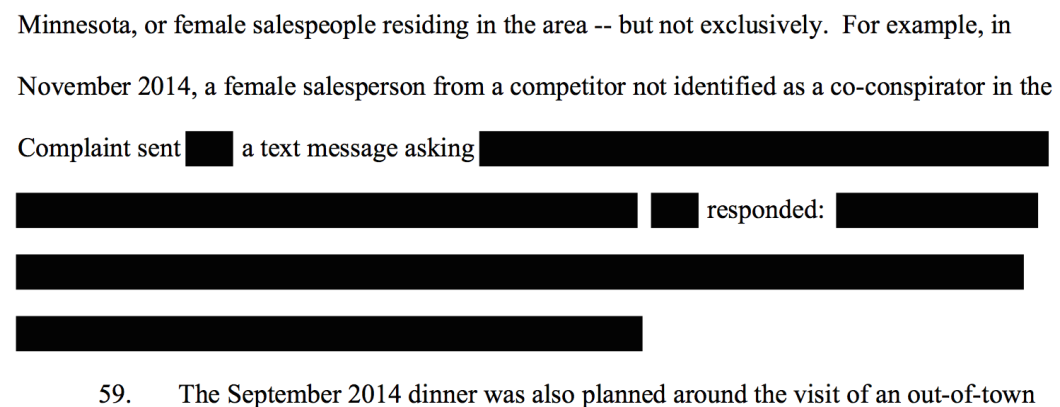20 States Accuse Teva, Mylan & Other Pharma Companies Of Price-Fixing
When the Justice Department announced it was bringing criminal charges against two former executives of a pharmaceuticals company, alleging a conspiracy to fix prices on generic drugs, we said that this was likely just the tip of the legal iceberg. Today, the industry ran smack into that iceberg — in the form of a lawsuit filed by twenty states against six different drug companies, including notables like Teva and Mylan.
In a 56-page complaint [PDF] filed in a federal court in Connecticut, attorneys general for the plaintiff states accuse Aurobindo Pharma USA, Citron Pharma, Heritage Pharmaceuticals, Mayne Pharma, Mylan Pharmaceuticals, and Teva Pharmaceuticals USA of participating in a “broad, well-coordinated and long-running series of schemes to fix the prices and allocate markets for a number of generic pharmaceuticals in the United States.”
While generic drugs are intended to be low-cost therapeutic equivalents of brand-name medications, prices for some generics have skyrocketed in recent years.
“Generic drug manufacturers argued publicly that the significant price increases were due to a myriad of benign factors, such as industry consolidation, FDA-mandated plant closures, or elimination of unprofitable generic drug product lines,” reads the lawsuit. “What the Plaintiff States have found through their investigation, however, is that the reason underlying many of these price increases is much more straightforward, and sinister – collusion among generic drug competitors.”
The lawsuit paints a picture of backroom handshake agreements between pharma executives to not compete with each other.
“The Defendants exploit their interactions at various and frequent industry trade shows, customer conferences and other similar events, to develop relationships and sow the seeds for their illegal agreements,” contends the complaint. “The anticompetitive agreements are further refined and coordinated at regular ‘industry dinners’, ‘girls nights out’, lunches, parties, and numerous and frequent telephone calls, emails and text messages.”
While the complaint hints at future legal actions involving other drugs — and probably other companies — this particular lawsuit deals specifically with price-fixing on two generic drugs — the popular antibiotic doxycycline hyclate, and diabetes medication glyburide — the same two drugs at the heart of the criminal case being brought by the DOJ against the former CEO and President of Heritage Pharmaceuticals.
This company, allege the states, was the “principal architect and ringleader” of the price-fixing on these two drugs, constructing a “wide-ranging series of conspiracies which included numerous generic drug manufacturers, all of whom were knowing and willing participants.”
The lawsuit contends that whenever one of these companies would enter into the generics market for a certain drug, the group of defendants would allegedly conspire to determine how much of the market share each participant in the conspiracy would receive. To make this happen, according to the states, the companies would either not submit bids for business with certain customers, or would submit bids they knew would fail, thus guaranteeing that a co-conspirator got that particular slice of the business.
Additionally, the states claim that the defendants conspired — typically via text messages or in person — to agree that they would raise prices collectively, effectively removing all competition from the market and allowing the drugmakers to set the price.
“The Defendants knew their conduct was unlawful,” reads the complaint. “Most of the conspiratorial communications were intentionally done in person or by cell phone, in an attempt to avoid creating a record of their illegal conduct… When communications were made in writing, or by text message, some of the Defendants even took overt and calculated steps to destroy evidence of those communications.”
Unfortunately, the juiciest bits of those conversations have been redacted from the publicly available complaint, much of which looks like this:

The companies have been accused of violating federal antitrust laws by conspiring to allocate the market for these two drugs and collectively raising prices on the drugs.
“Generic drugs play a critical role in moderating healthcare costs for all New Yorkers,” said New York Attorney General Eric Schneiderman in a statement. “Companies that collude and fix prices for generic drugs in order to pad their profits must be held accountable for the very real harm they inflict on New Yorkers’ ability to pay for life-saving medications.”
The lawsuit is being led by Connecticut Attorney General George Jepson.
“My office has dedicated significant resources to this investigation for more than two years and has developed compelling evidence of collusion and anticompetitive conduct across many companies that manufacture and market generic drugs in the United States,” said Jepsen in a statement. “Ultimately, it was consumers – and, indeed, our healthcare system as a whole – who paid for these actions through artificially high prices for generic drugs. We intend to pursue this and other enforcement actions aggressively.”
In addition to Connecticut and New York, the other plaintiff states in this lawsuit are Delaware, Florida, Hawaii, Idaho, Iowa, Kansas, Kentucky, Louisiana, Maine, Maryland, Massachusetts, Minnesota, Nevada, North Dakota, Ohio, Pennsylvania, Virginia, and Washington.
Want more consumer news? Visit our parent organization, Consumer Reports, for the latest on scams, recalls, and other consumer issues.

